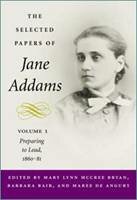


|
Sample Documents: John Greenleaf Whittier to Jane Addams, 1873 Feb 15 |
John Greenleaf Whittier to Jane AddamsIt is not surprising that the young Jane Addams was reading the poetry of John Greenleaf Whittier, nor that she found his poem "Barbara Frietchie" intriguing enough to write him a "fan" letter. Raised with the lore of the Civil War, Jane Addams grew to maturity in a period when the heroism of the male figures who participated in the struggle were memorialized in organization, stone, story, and song. In Whittier's popular poem, female heroism and courage were celebrated. Jane Addams evidently wondered how closely Whittier's fiction approximated real events. John Greenleaf Whittier (1807-92) was a Massachusetts editor and poet of Quaker upbringing. He wrote romantically of rural life and New England history, and championed themes of social justice. Before the war he was a lecturer at antislavery meetings and the editor of Pennsylvania Freeman (1838-40) and other periodicals, including the National Era (1847-60), to which he contributed many poems and articles. His poetry written in opposition to slavery was collected in Voices of Freedom (1846). In his latter life he wrote increasingly of the religious inspirations of nature. Whittier's "Barbara Frietchie" first appeared in the October 1863 Atlantic Monthly and then was reprinted in In War Time and Other Poems (1864). Written in couplets, it is a literary account of an historical incident that occurred in reaction to Stonewall Jackson's entry into Frederick, Maryland, on his way to the battle of Antietam in September 1862. Barbara Hauer Frietschie1 (1766-1862) was an elderly woman who raised the Union flag in defiance. "'Shoot, if you must, this old gray head, But spare your country's flag,' she said," wrote Whittier. Jackson, in admiration for her bravery, ordered his troops to march on. [Page image 1 and 2] [Page image 1] Amesbury [Mass.] 2nd Mo. [Feb.] 15-- 1873. My dear fr'd. Barbara Frietchie is real. I have her photograph taken after she was 90 yrs. old; a scrap of her silk dress, and a walking stick from the oaken frame of her house. I had the facts from Mrs. E. D. N. Southworth2 of Washington in the first place, & they have been confirmed by ample evidence since. Miss Dorothea S. Dix,3 the philanthropist, [Page image 2] visited Frederic City & wrote me a long letter about the brave old lady, who had then just died. I thank thee for thy generous appreciation of my writings. I am glad to know that they have given pleasure to thee. I am very truly Thy friend John G. Whittier. ALS (Swarthmore College Peace Collection; JAPM, 1:159-60; JAP, 1:102-03). 1. Whittier spelled his heroine's name "Frietchie." 2. E. D. E. N. (Emma Dorothy Eliza Neville) Southworth (1819-99), of Georgetown was a very popular nineteenth-century domestic novelist. She wrote over sixty romances including Curse of Clifton (1852), Missing Bride (1855), Hidden Hand (1859), and Maiden Widow (1870). During the Civil War, she served as a nurse in a Union hospital near her home.
3. Dorothea L. Dix (1802-87), humanitarian and reformer, served as superintendent of nurses for the Union army during the Civil War. |